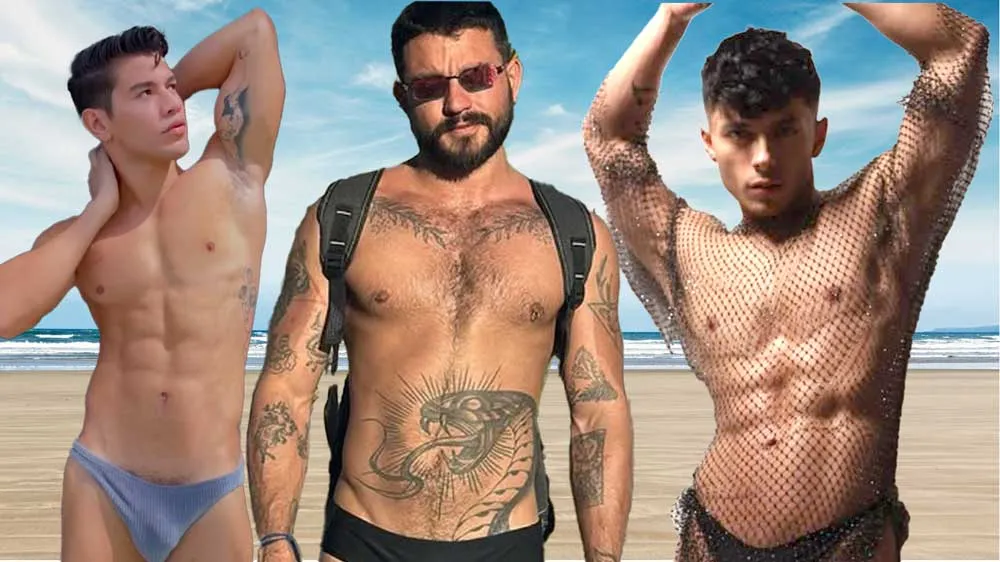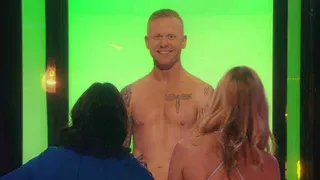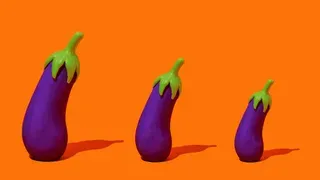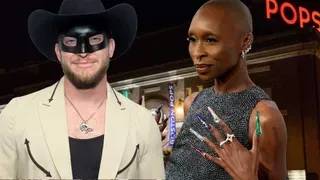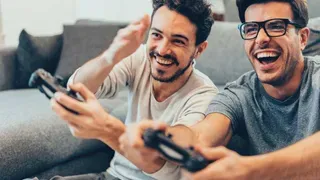September 21, 2014
Melissa Etheridge :: This Is M.E.
Kilian Melloy READ TIME: 8 MIN.
Integrity.
That's the word that comes to mind after speaking with Melissa Etheridge. She is one of the most popular singer/songwriters of our generation, with millions in album sales and multiple Grammy nominations. If there ever was a singer/songwriter who represented the LGBT community artistically and in music, she is it.
Part of a generation of women who were very active, very organized and very vociferous, she, along with the likes of k.d. lang, Ellen DeGeneres, Rosie O'Donnell and Urvashi Vaid pushed the boundaries in music, film, television and politics. Doing so, by being some of the first to publicly acknowledge and live as who they are.
Out, proud and doing it across America's airwaves.
A new chapter has begun with her aptly titled album, "This Is M.E.," the full release of which is coming on Tuesday, September 30. Though its throwback Etheridge-style single"Take My Number"is already much receiving radio play and praise. There is a great deal to glean from her life, her music and her concept of what it takes to survive.
We hope you enjoy this little slice of her wisdom.
An in-depth conversation with Melissa Etheridge:
You have talked about emotional loneliness growing up and how that pushed you into music, I'm curious about how much of that still motivates you. It seems to me that composing and writing is at its core, sort of an isolated process.
You know, it usually is. Up until this album, the process has been me alone in a room, looking up to the sky and saying "come to me, inspiration please come to me... thought, emotion, whatever it is, help me and let me make it universal." For the first time, with this album, it was unique for so many reasons. This is my first independent release; it's the first time I actually own the record, so the whole process of making it was different.
Usually a record company gives me a chunk of money and then I go into the studio, hire a producer, write the songs and boom... it's done. You just go in and do it. These days, you don't have the up-front money anymore. Now it's, I am going to collaborate with you Mr. Producer... I am going to come into your studio and you're going to give me studio time and your time. Let's try to create something together and if it's good, we'll move forward with it. If it's not good, then it's "Thank you very much," and that's it. No money, no foul, no anything.
With this album I collaborated much more. There were some instances where I created songs right there in studio, together with other people. I had never done that before. The urban and the more R&B soul stuff that I was doing was just, "Here we go, we're cookin,' makin' soup and we're all throwing everything in."
It seems like it harkens back to the '50 and '60 acoustic recording sensibility, more spontaneous. Performers and bands jammed and laid tracks down without the advan- tages of mixing boards and the like.
Absolutely. It was magical and gave me things like "Monster," "Do It Again," and "Ain't That Bad." They have a culture of freestyle that is just amazing. Sort of turn the microphone on and sing whatever comes - however you are inspired - It was frightening to me (laughs). It was also exhilarating too; I really enjoyed it so much.
Tell me a little about "Take My Number," it's a bit of a throwback to your earlier music.
It was one of the reasons we wanted to put that song out first. To reestablish a connection to people who are familiar with my music. The song is a beautiful little nugget that opens the door to the rest of the album that goes deep into all kinds of musical genres. It is filled with fun, strong songs - it's still essentially me - just in different vehicles.
It's refreshing to see you experiment, I especially love "Monster," it has such a distinct feel. It speaks to so many serious things, homophobia and fear of any kind of differences. Yet, there is a humor to it. All I kept picturing in my mind was Godzilla (laughs).
Exactly, he's a big old monster, but he's also really sweet. That's how anything that we're afraid of is, any kind of diversity and adversity. There's a hard first impression, but there's really love inside of all of it.
I love how different the world is now. There is still a large lesbian following in my crowd, but there's a good percentage of it that isn't now. They make up about 30 percent and the rest is gay men, straight men and women, and even kids, pretty much everything.
You collaborated with an amazing array of people for This Is M.E., Jerrod Betti, Jon Levine, Jerry Wonda and RoccStar. What was it like working with RoccStar in particular?
My favorite story about RoccStar was when we first met. He was looking at me and I was checking him out and thinking, well, I guess this could work (laughs)... We got along great and he started by playing a single beat, sort of a marching drum bass. I pulled out my electric guitar (laughs); he'd never used real guitars (laughs)... He was like what's this?
So, I'm playing and after that, I started to sing. We laid down some vocals and he jumps on the computer in the engineer's seat and started trying to do something. He turned to the engineer and says, "Where's the Auto-Tune?" (Laughs) The engineer says, "I would never presume to put Auto-Tune on Ms. Etheridge's voice." RoccStar said, "She's been singing like that without it?" He couldn't believe that I could actually perform without it. I laughed and said,"Long ago, there was this time before Auto-Tune, when you actually had to sing on key!"
That is hysterical. It does seem like there is a shift back toward real musicianship again. You actually have to be able to carry a tune successfully.
Yes. I find that true not only in music, but in everything. Even with my children, they resonate and know when what they are hearing is candy. They know when it's fake. They like the candy and it has its place, but they have such a great appreciation for someone who can actually sing. They know the difference when they hear a really great acoustic guitar. When they hear a live band, my kids call them "Civil War bands" (laughs), artists that are playing real acoustics with true strings; it makes a difference to them.
I enjoy immensely that you have always managed to stay true to that ideal. I believe that it really counts for something.
It's a funny thing, because there are moments when the public is in that space with me at the same time and that is so great. Then, there are times when they are very far away (laughs). But I know that the choices that I make are the ones that I have to because that's what is real for me.
I love to ask performers about the moment in their careers, when they realized that everything had changed. Did you have that sort of an "ah-ha" moment?
You know, it was a gradual, slow kind of thing. It was a slow climb up the ladder and really it still is. I was so grateful when I got my first job here in L.A.
playing at a bar five nights a week, makin' money and thinking how unusual that was. It was in Long Beach actually, The Executive Suite was the first place.
Such a small world, we actually have had them in our magazine as advertisers.
That's so funny. Unfortunately they don't have live music there anymore. After The Suites I went to the Que Sera Sera and I played there for five years. That's what supported me and every time a record executive came to hear me it was, maybe, maybe... and then finally after five years, I got a record contract. But even then, you still gotta work that. It's a constant kind of thing.
Even in '94 when finally my fourth record hit big, I didn't really realize that I was "in it." It wasn't really until the turn of the century, where I began to think that I had really done something. You just keep working and still climbing and loving it - that's the key - loving it.
Was there a specific moment when you decided it was time to come out and be more involved in the LGBT movement?
That was a gradual process. Playing the women's bars and being a part of the huge women's community in the '80s in Los Angeles and in Long Beach,
which was politically charged and highly organized at that time. Those women were the ones that would come to the bars every Wednesday and Friday to hear me play. I knew them well and they taught me and showed me what politics was about - how things needed to change and how we could change them.
Those were the days when I was hanging out with k.d. lang, Ellen DeGeneres and Rosie O'Donnell and we were all working on our careers. Then, once we get into the '90s, I was totally out and hanging with people like Urvashi Vaid and Alan Hergott, these leaders of our movement, giants who were making a difference. Margarethe Cammermeyer, people like them made me realize that I needed to be more out.
You have to remember that there was sort of a "Don't Ask, Don't Tell" mentality in the recording in- dustry then. I was completely willing to talk about it at the time but no one was asking me about it. It was during my time helping on Bill Clinton's campaign that I walked out and just said,"Hey, I'm a big lesbian!" (Laughs)
One of my fondest memories of you, is your Grammy performance after your cancer battle - it was such a powerful moment. How did your perspective change on your career after that?
The biggest thing was just surviving the cancer in general and that health crisis. Coming out the other end and realizing that my health is the most important thing. If I don't have that, I have absolutely nothing. It really set me on a journey of what is health, what does that even mean for me?
Deciding to be on the Grammys was a very personal thing. I remember getting the call and at that time I was still very sick from the chemo and thought, "I don't know if I can actually do it." Then realizing that I really wanted to do the Janis Joplin tribute, "Piece Of My Heart." If I said, "No," I would have hated sitting at home, watching someone else sing it. So, I had to do it, bald or not, sick off chemotherapy, I didn't care. I had to perform that song.
From the moment I walked out on stage I was blown away. Holding that moment and just taking it in. Then, as the hours, days and weeks unfolded,
I came to understand that it was a big deal. Doing something for myself, something to come back and show everybody that I am strong. Letting everyone know that this is not taking me down, I am winning now. I have my health now and I know what I am going to do with it. It was an amazing moment.
For much more of our interview with Melissa Etheridge go to ragemonthly.com.
For information about Melissa Etheridge, to pre-order This Is M.E. and her upcoming concert tour schedule, go to melissaetheridge.com
Kilian Melloy serves as EDGE Media Network's Associate Arts Editor and Staff Contributor. His professional memberships include the National Lesbian & Gay Journalists Association, the Boston Online Film Critics Association, The Gay and Lesbian Entertainment Critics Association, and the Boston Theater Critics Association's Elliot Norton Awards Committee.
